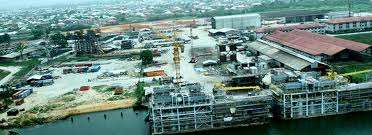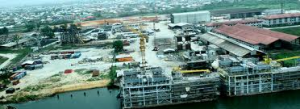Oil
Nigeria set to become Africa’s Oil and Gas industry hub

By Yemie ADEOYE
…drives indigenous participation to 18% in 4 years
HOUSTON TX-FOUR years after the enactment of the Nigerian Oil and Gas Industry Act, the Nigerian Content Development and Monitoring Board (NCDMB) in its quest to position the country as Africa’s Oil and Gas industry hub has driven indigenous growth by 18 percent even has it has also saved the country well over 12.7 billion dollars annually in capital flight.
As the federal Government Agency saddled with the responsibility of implementing the NOGIC Act, the NCDMB has developed concepts that has driven indigenous participation in the oil and gas industry from five to 18 percent in a spate of 4 years, an effort which has positioned Nigeria as the emerging oil and gas industry hub.
Currently East Africa is intensely working to become a central Oil and Gas hub for Africa by the 2020 kudos to the efforts of Kenya, Mozambique and Tanzania. But with efforts of the NCDMB that dream might as well remain a dream.
Since its inception, the NOGICD Act, it has enhanced job creation and the development of indigenous human and technical expertise. This has further stimulated other sectors of the economy and ultimately, it will continue to positively impact Nigeria’s Gross Domestic Product.
Speaking at the recently held Practical Nigerian Conference Content seminar held in Yenagoa, capital of Bayelsa state, south-south Nigeria, the Minister of Petroleum Resources, Mrs Diezani Alison Madueke took time out to enumerate the success of the NOGIC Act as been driven and implemented by the NCDMB even as she also noted that there are some of the challenges that local companies are faced with e.g. technical knowhow, finance etc. “The good news however, is that Government – through the NCDMB – are putting processes and initiatives in place to combat these challenges. Some of these initiatives include partial guarantee of loans through NCDF and various capacity development initiatives.”
Mrs. Madueke further stated that these targets were driven by the desire of government to maximize the utilization of Nigerian goods and services across the oil & gas industry value chain within the shortest time possible. “The targets were set to ensure functional linkage of the oil and gas sector to other sectors of the national economy, domiciliation of critical industry assets and creation of credible local supply base of oil & gas equipment and services in Nigeria.”
“I am delighted to say that the implementation of the targets over the last four years are beginning to yield visible dividends and it is important to share some of the success stories with you.”
“In the area of Indigenous ownership of assets Nigerian ownership of strategic assets like marine vessels and oil rig assets are cardinal to local content development. Measures have been put in place to encourage local investments on such critical assets. There is also a certification regime in place to audit equipment ownership claims and ensure that no foreign equipment or asset is put to work until existing Nigerian capacities have been exhausted” she said.
The Minister who was ably represented at the event by the Permanent Secretary, Ministry of Petroleum Resources Dr. Jamila Shu’ara told the gathering of top players in the oil and gas industry that since the implementation of the marine vessel utilization strategy in 2013, there has been a marked growth in the number of Nigerian owned vessels that are doing business in the oil & gas industry. She explained that out of 1,000 marine vessels that were captured by the Board in 2013, 49.5 percent were in category A, meaning they were either built in Nigeria or owned by Nigerians. Also, out of 1,232 vessels captured as at 3rd Quarter of 2014, 89.2 percent were in category A (and class AAA).
Speaking in the area of Infrastructure Development & Facility Upgrade, the minister said that NigerDock now has the largest dry-dock facility in West Africa for maintenance and service of medium-sized vessels, a direct result of the local content policy, even as she noted that a minimum of two additional dry-docking facilities will be required within the shortest possible time for vessel maintenance and ship repairs in view of the growing economic and maritime activities in Nigeria and West Africa. “Such dry-docking facilities would also put the nation on a right path towards building ocean going vessels. Government is keen on encouraging investments in this area. A new dry dock facility would attract about $1billion dollars into the Nigerian economy and generate over 9,000 direct and ancillary employment opportunities for Nigerians.”
The NCDMB by virtue of its clear cut implementation of the NOGIC Act and creative thinking aimed at making a success story of Nigerian Content has also brought about Upgrades of Fabrication Yards.
Oil
NNPC Discovers Over 4,800 Illegal Pipeline Connections

The Nigerian National Petroleum Company (NNPC) Limited has revealed the detection of more than 4,800 unauthorized connections on oil pipelines within the country, painting a troubling image of the nation’s primary source of revenue.
Mele Kyari, the Group Chief Executive Officer of NNPC Ltd, communicated this information to the Senate Committee on Appropriations last Friday.
He said, “We have over 4,800 illegal connections on our pipelines. That means in some lines, within 100 kilometres of pipelines, you have as much as 300 insertions.
“Therefore, even when you produce the oil, you cannot deliver them at the required pressure and therefore the volume will also be less.”
As per the NNPC Ltd chief, individuals from various regions enter the Niger Delta, inserting unauthorized connections on pipelines in Nigeria’s oil-producing area.
This recent revelation follows a prior discovery of 295 illegal connections to the pipelines by the firm a year ago, underscoring the escalating issue of crude oil theft in Nigeria.
Two years earlier, Kyari had highlighted the country’s daily loss of 200,000 barrels of oil, amounting to $13 million due to theft and vandalism.
He further stated “We have two sets of losses, one coming from our products and the other coming from crude oil. In terms of crude losses, it is still going on. On the average, we are losing 200,000 barrels of crude every day.”
After the discovery, Nigeria’s security forces pledged to enhance security around the country’s pipelines.
To bolster this, the Federal Government granted a multi-billion naira pipelines surveillance contract to Tantita Security Services, headed by former militant leader Government Ekpemepulo, also known as Tompolo.
Despite facing criticism for this decision, Senator Heineken Lokpobiri, the Minister of State for Petroleum, remains convinced that it was the appropriate course of action.
In August, following a tour of oil facilities in the Niger Delta, Senator Heineken Lokpobiri expressed gratitude to Tantita, commissioned by NNPC Ltd, for their ongoing work.
He also hinted at plans for further extensive endeavors in the future.
In 2021, after extensive debate and delays, the Petroleum Industry Bill was finally passed to attract increased foreign investment into the oil sector through amendments to regulations, royalties, and taxes.
Oil
Dangote Refinery Set To Begin Fuel Production With First Crude Arrival

Nigeria’s colossal $19 billion Dangote Refinery, after encountering several setbacks, is on the verge of kickstarting fuel production.
This achievement is heralded by the arrival of the first crude shipment, transported by the OTIS tanker carrying 950,000 barrels of Nigeria’s Agbami crude.
S&P Global, citing industry sources and tanker tracking data on spglobal.com, reported the tanker’s departure on December 6, en route to Lekki, the nearest land port to Dangote’s offshore crude receiving terminal.
Scheduled to reach its destination around 8 PM on December 7, the arrival of this shipment signifies the commencement of crude supplies for the refinery’s operations.
Chartered by the state-owned Nigerian National Petroleum Company (NNPC), the Suezmax tanker is an emblem of the initial crude supply to Dangote’s cutting-edge refinery, as disclosed by a West African oil trader familiar with the matter in the S&P report.
Even though the refinery was officially completed in May, the absence of domestic crude feedstock had hindered oil product manufacturing.
To address this, the NNPC, holding a 20% stake in the refinery, struck an agreement to provide 6 million barrels of crude oil as feedstock to the Dangote refinery in December.
This move aims to jumpstart operations and overcome the previous impediments.
Agbami, operated by Chevron, holds a prominent position among Nigeria’s major deepwater developments, producing around 100,000 barrels per day in the central Niger Delta.
Known for its light sweet crude qualities, with a specific gravity of 47.9 API and a low sulfur content of 0.04%, Agbami produces substantial amounts of naphtha and kerosene.
NNPC has chartered additional shipments from different Nigerian offshore fields to the refinery, marking the start of a sequence of planned crude supplies for the month, as mentioned by the oil trader.
Located on the outskirts of Lagos, Nigeria’s commercial hub, the Dangote Refinery encountered repeated delays since its 2013 announcement, despite significant installation progress in 2019.
The refinery, designed to handle multiple crudes simultaneously, targets three Nigerian crude grades—Escravos, Bonny Light, and Forcados. When operating at full capacity, it aims to produce 327,000 barrels per day (b/d) of gasoline, 244,000 b/d of gasoil/diesel, 56,000 b/d of jet fuel/kerosene, and 290,000 metric tons per year of propane/LPG.
Dangote’s operations starting signify Nigeria’s hopes to lessen its reliance on gasoline imports, addressing the deficiencies of its existing refineries undergoing repairs. This shift is poised to reshape Nigeria’s oil industry, potentially leading to gasoline self-sufficiency by the 2040s.
Dangote officials anticipate an initial output of 370,000 barrels per day (b/d), emphasizing jet fuel and diesel production.
Industry analysts, however, project the refinery to reach its full operational capacity by mid-2025, although potential delays remain a looming concern.
Oil
NNPCL Sets Dec 2024 Terminal Date For Fuel Importation

The Nigerian National Petroleum Company Limited (NNPCL) has announced intentions to cease importing refined petroleum products by December 2024, anticipating full operational functionality for all national refineries by that time.
Group CEO, NNPC Ltd, Mele Kyari, shared this at a meeting with Speaker Tajudeen Abbas of the House of Representatives, who advocated for the privatisation of Nigeria’s refineries on Thursday.
Projections indicated the national oil firm’s revenue could climb to N4.5 trillion by the conclusion of 2023. Moreover, the rehabilitation of the Port Harcourt Refining Company, managed by NNPCL, was slated for completion by December of the current year.
Meanwhile, Oil marketers verified on Thursday that the Port Harcourt refinery is set for operations, potentially starting in January 2024. They emphasized that once operational, this refinery could notably reduce the prices of refined petroleum products.
During the meeting in Abuja, Kyari asserted Nigeria’s intention to cease importing refined petroleum products by 2024, envisioning the country’s emergence as a net exporter of these commodities within the same year.
He outlined the plans for launching operations at the Port Harcourt, Warri, and Kaduna refineries.
Kyari reiterated that all refineries would operate at full capacity, ultimately paving the way for Nigeria to transition into a net exporter of petroleum products by the conclusion of 2024.
He attributed the inactivity of Nigeria’s refineries over the years to the petroleum subsidy, emphasizing that the removal of this subsidy was drawing significant private-sector investments into the sector.
Kyari said “I can confirm to you that by the end of December this year, we will start the Port Harcourt refinery; early in the first quarter of 2024, we will start the Warri refinery and by the end of 2024, Kaduna refinery will come into operation.
“This is the commitment we are giving today and you can hold us accountable for this. In 2024, many of the initiatives including the rehabilitation of our refineries and also the efforts of small-scale refineries, and the upcoming Dangote refinery, will make Nigeria a net exporter of petroleum products in 2024.
“We will no longer be talking about fuel importation by the end of 2024. I am very optimistic that this will crystallise.
Kyari promised that by the conclusion of 2023, the government’s anticipated revenue from the company would reach N4.5 trillion, emphasizing NNPCL’s adherence to the Petroleum Industry Act and its commitment to delivering value to shareholders.
Recall that in October 2023, it was reported that Nigeria’s monthly spending on the importation of Premium Motor Spirit, known as petrol, had reached approximately N843 billion due to NNPCL’s cessation of oil swaps.
In July of this year, the Nigerian Midstream and Downstream Petroleum Regulatory Authority reported that during the post-deregulation period, spanning June 1 to June 28, 2023, the country’s total petrol consumption amounted to 1.36 billion litres, with an average daily consumption of 48.43 million litres.
The average ex-depot price of petrol, sourced solely from NNPCL as the importer, stands at about N580 per litre.
However, both NNPCL and oil marketers declared on Thursday that this substantial oil import expenditure would soon diminish.
They anticipated a drop once the Port Harcourt refinery commences production of refined petroleum products from January 2024, barring any unforeseen circumstances.










